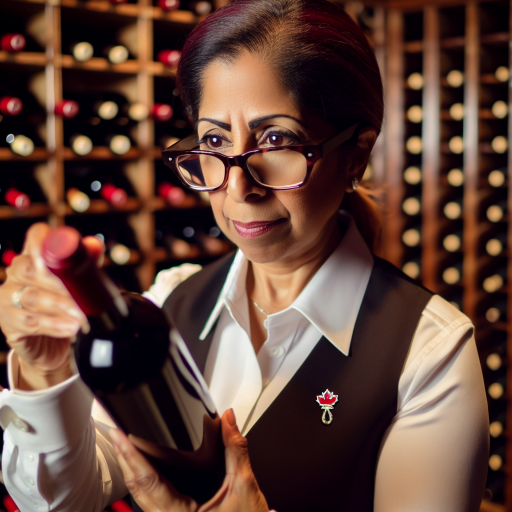Introduction
A. Canadian Culinary Excellence
Embark on a culinary journey by discovering the top Canadian culinary schools that sculpt culinary maestros.
B. Choosing the Right Path
Selecting the right culinary school is paramount for a flourishing career in the culinary realm. It shapes skills, networks, and future opportunities.
C. Aim of the Blog Post
This post serves as a compass, guiding aspiring chefs to the pinnacle of Canadian culinary education.
Uncover insights into the finest culinary institutes across the maple-rich landscape.
Read: Cultural Sensitivity in Canadian Tour Guiding
Factors to Consider When Choosing a Culinary School
When embarking on a culinary journey, choosing the right culinary school is of utmost importance.
The right school will provide aspiring chefs with the necessary skills and knowledge to succeed in the competitive culinary industry.
Here are some factors to consider when making this important decision:
A. Location and Accessibility
- Consider schools that are easily accessible and located in areas with a thriving culinary scene.
- Proximity to local markets and farms can provide valuable opportunities for sourcing fresh ingredients.
- Consider the cost of living in the location, as it may affect your budget as a student.
B. Accreditation and Certification
- Ensure that the school is accredited by a respected culinary organization.
- Accreditation ensures that the school meets certain standards in terms of curriculum and facilities.
- Look for schools that offer certifications recognized in the culinary industry to improve job prospects.
C. Curriculum and Specializations
- Review the curriculum to ensure it covers all aspects of culinary arts, from basic skills to advanced techniques.
- Consider schools that offer specialized programs in areas such as pastry arts or international cuisine.
- A diverse curriculum will broaden your culinary knowledge and enhance your culinary repertoire.
D. Hands-on Training Opportunities
- Practical experience is crucial for culinary students, so choose a school that offers ample hands-on training.
- Look for schools with well-equipped kitchens and state-of-the-art facilities for realistic training.
- Internship or apprenticeship programs can provide valuable real-world experience and networking opportunities.
E. Industry Connections and Job Placement Assistance
- Consider schools with strong ties to the culinary industry, as they can provide valuable networking opportunities.
- Look for schools that offer job placement assistance to help graduates kick-start their culinary careers.
- Alumni networks and partnerships with renowned restaurants can open doors to exciting job prospects.
Choosing a culinary school is a significant decision that can shape your future as a chef.
By considering these key factors, you can make an informed choice and set yourself up for success in the culinary industry.
Read: A Day in the Life of a Toronto Chef

Top Canadian Culinary Schools for Aspiring Chefs
A. George Brown College
George Brown College offers a comprehensive culinary program that prepares students for success in the industry.
With a focus on hands-on learning, students gain practical experience in state-of-the-art labs and kitchens.
The program highlights notable courses such as Culinary Techniques, Baking and Pastry Arts, and Global Gastronomy.
Students can also specialize in areas such as Italian cuisine, Asian cuisine, and French pastry.
George Brown College provides students with access to top-notch resources and facilities, including a culinary library, computer labs, and a culinary skills competition team.
These resources help students enhance their skills and knowledge.
Several notable alumni have found success after graduating from George Brown College.
Celebrity chef David Rocco and renowned pastry chef Anna Olson are just a few examples of the successful careers that have started at this culinary institution.
B. Stratford Chefs School
Stratford Chefs School takes a unique approach to culinary education by offering a collaborative and immersive learning experience.
The school focuses on apprenticeships and hands-on training to develop culinary skills.
One of the highlights of the program is the apprenticeship program, where students work alongside professional chefs in top restaurants.
This real-world experience provides invaluable knowledge and mentorship.
The school also emphasizes collaborations with local farmers and artisans, promoting sustainable and local sourcing.
This unique approach allows students to connect with the community and gain a deep understanding of food production.
Stratford Chefs School has received numerous achievements and accolades, including being named one of the top culinary schools in Canada by the National Post.
C. SAIT Culinary Campus
The SAIT Culinary Campus offers comprehensive culinary arts programs that prepare students for diverse careers in the industry.
The programs focus on theoretical knowledge and hands-on practical training.
Students have access to state-of-the-art facilities, including teaching kitchens equipped with the latest culinary tools and equipment.
The campus also features culinary gardens where students can explore farm-to-table practices.
SAIT has strong industry partnerships and connections, which provide students with opportunities for co-op placements and networking.
These connections enhance students’ practical experience and increase their employability.
The success of SAIT’s culinary program is evident through its notable alumni, such as chef David Leeder, who has worked at Michelin-starred restaurants and won several prestigious awards.
D. Vancouver Community College
Vancouver Community College is renowned for its culinary arts programs that provide students with a solid foundation in the culinary world.
The programs cover various aspects of the industry, including cooking techniques, menu planning, and food safety.
The college takes pride in its sustainable practices and farm-to-table approach, promoting responsible sourcing and environmental consciousness.
Students learn the importance of using local, seasonal ingredients to create delicious and sustainable dishes.
Vancouver Community College collaborates with local restaurants, allowing students to gain real-world experience and build industry connections.
This practical experience further enhances students’ skills and prepares them for a successful career.
The college also offers career services and opportunities for students, including job fairs, networking events, and job placement assistance.
These resources support students in finding employment in the culinary field after graduation.
Basically, aspiring chefs in Canada have a variety of top culinary schools to choose from.
Whether it’s George Brown College, Stratford Chefs School, SAIT Culinary Campus, or Vancouver Community College, these institutions provide excellent programs, resources, and opportunities to help students succeed in the culinary industry.
Unlock Your Career Potential
Visualize a clear path to success with our tailored Career Consulting service. Personalized insights in just 1-3 days.
Get StartedRead: Famous Canadian Chefs and Their Signature Dishes
Scholarships, Financial Aid, and Tuition
When it comes to pursuing a career in the culinary arts, choosing the right culinary school is essential.
However, it is equally important to consider the financial aspects before making a decision.
Here are some key points to keep in mind:
A. Importance of Considering Financial Aspects
- Before enrolling in a culinary school, it is crucial to assess your financial situation and determine what you can afford.
- Attending a culinary school can be expensive, and it is important to understand the long-term implications.
- Considering the financial aspects helps in making an informed decision and avoids unnecessary debt.
- Financial considerations are especially crucial for aspiring chefs who may not have a steady income initially.
B. Scholarships, Grants, and Bursaries
- Many culinary schools offer scholarships, grants, and bursaries to talented students who need financial assistance.
- These financial aids can significantly reduce the overall cost of culinary education.
- Some scholarships are specifically designed for aspiring chefs and culinary students.
- Researching and applying for scholarships can help in reducing the financial burden of attending culinary school.
C. Tuition Fees and Other Related Costs
- While tuition fees vary among culinary schools, they can be quite high.
- It is important to consider tuition fees as well as other related costs such as textbooks, ingredients, and culinary equipment.
- Some culinary schools may also charge additional fees for uniforms, lab supplies, and kitchen tools.
- Understanding the complete cost of attending a culinary school helps in budgeting and financial planning.
D. Tips on Managing Finances
- Create a realistic budget by evaluating your income and expenses while attending culinary school.
- Consider living arrangements that are affordable and close to the culinary school.
- Take advantage of student discounts on groceries, cooking supplies, and culinary-related events.
- Explore options for part-time work or paid internships to generate additional income.
- Avoid unnecessary expenses and prioritize spending on essentials related to your culinary education.
Therefore, when choosing a culinary school, it is essential to carefully consider the financial aspects.
Scholarships, grants, and bursaries can significantly reduce the overall cost. Understanding the tuition fees and related expenses ensures better financial planning.
Managing finances while attending culinary school requires budgeting and making smart choices.
By considering these aspects, aspiring chefs can pursue their culinary dreams without unnecessary financial burdens.
Read: The Evolution of Canadian Cuisine by Chefs
Conclusion
A. Choosing the Right Culinary School
Selecting the right culinary school is paramount for aspiring chefs. It shapes skills, networks, and future opportunities.
B. Encouraging Further Research and Visits
Engage in extensive research. Visit prospective schools, attend open houses, and speak with instructors to make informed decisions.
C. Recap of Top Canadian Culinary Schools
Recapping, the top Canadian culinary schools include:
- George Brown College
- Culinary Institute of Canada
- SAIT Culinary Campus
- Pacific Institute of Culinary Arts
- Humber College
D. Call-to-Action for Pursuing Culinary Passion
Embark on your culinary journey. Explore, learn, and apply to the culinary school that resonates with your aspirations.
Success awaits!




